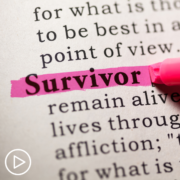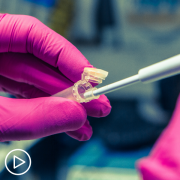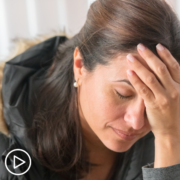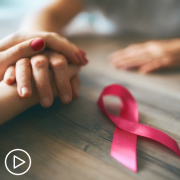What Do Breast Cancer Patients Need to Know About COVID?
What Do Breast Cancer Patients Need to Know About COVID? from Patient Empowerment Network on Vimeo.
Due to COVID-19, many patients with breast cancer have faced new challenges when it comes to receiving care. Dr. Lisa Flaum addresses precautions when receiving care, and the role of telemedicine in virtual care.
Dr. Lisa Flaum is a Medical Oncologist at the Robert H. Lurie Comprehensive Cancer Center of Northwestern University. Learn more here.
See More From The Pro-Active Breast Cancer Patient Toolkit
Related Programs:

|

|
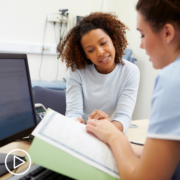
Are You Prepared for Your Breast Cancer Appointment? Expert Tips. |
Transcript:
Dr. Flaum:
Right, so COVID has introduced challenges for all of us, for cancer patients specifically. However, we have not typically altered our recommendations for appropriately treating patients based on COVID. So, any of the treatments that would be appropriate are still appropriate, and for most patients, I’m recommending that they follow the guidelines that they are likely following otherwise. I think that a lot of the precautions that are put in place from a COVID standpoint, which are people are washing their hands, and sanitizing, and wearing masks, and keeping distance, and not socializing and big crowds, all of those things are already helping our patients and certainly prevent COVID, but also prevent all the normal stuff that people are typically exposed to when they’re going through a cancer diagnosis.
What I tell people is that they’re already probably going above and beyond what we would have recommended in a normal setting of metastatic cancer. Although they’re likely at a little higher risk, depending on what they’re receiving, than the general population, for the most part, patients have done well and we have not seen an excess number of COVID cases in our patient population. Again, it’s likely because people are doing the right things anyway, COVID or not COVID, and certainly regardless of their cancer diagnosis.
I guess the one change or the changes that we’ve made is implementing a little more tele-medicine versus in person visits when it’s appropriate. So, there are things that we can accomplish over the phone in terms of managing side effects and asking how patients are doing.
Obviously we can’t do an exam, we can’t do imaging, but a number of things can take place over the phone and we’ve made accommodations in terms of some of that to allow for patients to stay out of the hospital setting as much as possible.
In some situations, it has impacted decision making if there’s a choice between one treatment and another, and one is more aggressive or more suppressing of the immune system, if you’re going to weigh the normal pros and cons and we’re always going to throw COVID into the mix. Well, if you’ve got this particular treatment, your immune system shouldn’t be as suppressed, you don’t have to come in as often, you don’t require an IV. So, the variables definitely come into play, but certainly COVID doesn’t prohibit us from choosing any given option, but it affects some of the discussion in most cases.



